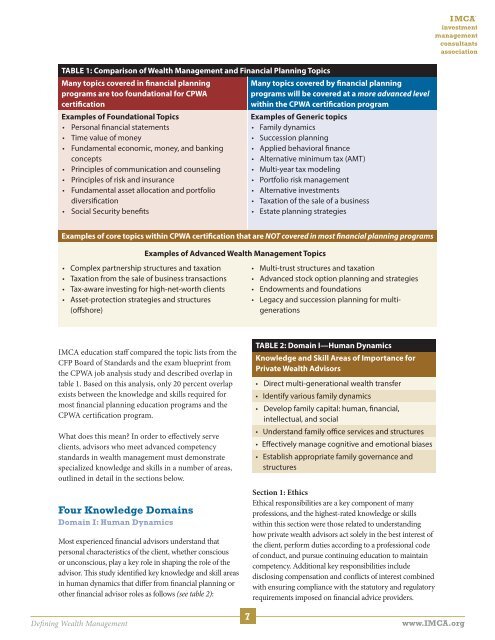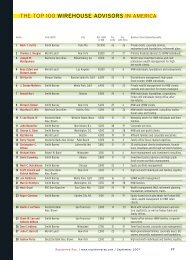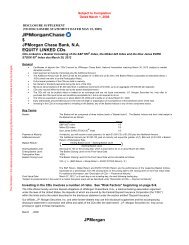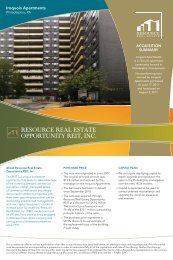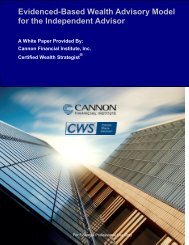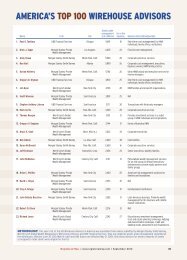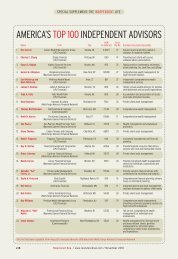Defining Wealth Management, Serving High-Net-Worth Clients
Defining Wealth Management, Serving High-Net-Worth Clients
Defining Wealth Management, Serving High-Net-Worth Clients
Create successful ePaper yourself
Turn your PDF publications into a flip-book with our unique Google optimized e-Paper software.
investment<br />
management<br />
consultants<br />
association<br />
TABLE 1: Comparison of <strong>Wealth</strong> <strong>Management</strong> and Financial Planning Topics<br />
Many topics covered in financial planning<br />
programs are too foundational for CPWA<br />
certification<br />
Examples of Foundational Topics<br />
• Personal financial statements<br />
• Time value of money<br />
• Fundamental economic, money, and banking<br />
concepts<br />
• Principles of communication and counseling<br />
• Principles of risk and insurance<br />
• Fundamental asset allocation and portfolio<br />
diversification<br />
• Social Security benefits<br />
Many topics covered by financial planning<br />
programs will be covered at a more advanced level<br />
within the CPWA certification program<br />
Examples of Generic topics<br />
• Family dynamics<br />
• Succession planning<br />
• Applied behavioral finance<br />
• Alternative minimum tax (AMT)<br />
• Multi-year tax modeling<br />
• Portfolio risk management<br />
• Alternative investments<br />
• Taxation of the sale of a business<br />
• Estate planning strategies<br />
Examples of core topics within CPWA certification that are NOT covered in most financial planning programs<br />
Examples of Advanced <strong>Wealth</strong> <strong>Management</strong> Topics<br />
• Complex partnership structures and taxation<br />
• Taxation from the sale of business transactions<br />
• Tax-aware investing for high-net-worth clients<br />
• Asset-protection strategies and structures<br />
(offshore)<br />
• Multi-trust structures and taxation<br />
• Advanced stock option planning and strategies<br />
• Endowments and foundations<br />
• Legacy and succession planning for multigenerations<br />
IMCA education staff compared the topic lists from the<br />
CFP Board of Standards and the exam blueprint from<br />
the CPWA job analysis study and described overlap in<br />
table 1. Based on this analysis, only 20 percent overlap<br />
exists between the knowledge and skills required for<br />
most financial planning education programs and the<br />
CPWA certification program.<br />
What does this mean? In order to effectively serve<br />
clients, advisors who meet advanced competency<br />
standards in wealth management must demonstrate<br />
specialized knowledge and skills in a number of areas,<br />
outlined in detail in the sections below.<br />
Four Knowledge Domains<br />
Domain I: Human Dynamics<br />
Most experienced financial advisors understand that<br />
personal characteristics of the client, whether conscious<br />
or unconscious, play a key role in shaping the role of the<br />
advisor. This study identified key knowledge and skill areas<br />
in human dynamics that differ from financial planning or<br />
other financial advisor roles as follows (see table 2):<br />
TABLE 2: Domain I—Human Dynamics<br />
Knowledge and Skill Areas of Importance for<br />
Private <strong>Wealth</strong> Advisors<br />
• Direct multi-generational wealth transfer<br />
• Identify various family dynamics<br />
• Develop family capital: human, financial,<br />
intellectual, and social<br />
• Understand family office services and structures<br />
• Effectively manage cognitive and emotional biases<br />
• Establish appropriate family governance and<br />
structures<br />
Section 1: Ethics<br />
Ethical responsibilities are a key component of many<br />
professions, and the highest-rated knowledge or skills<br />
within this section were those related to understanding<br />
how private wealth advisors act solely in the best interest of<br />
the client, perform duties according to a professional code<br />
of conduct, and pursue continuing education to maintain<br />
competency. Additional key responsibilities include<br />
disclosing compensation and conflicts of interest combined<br />
with ensuring compliance with the statutory and regulatory<br />
requirements imposed on financial advice providers.<br />
<strong>Defining</strong> <strong>Wealth</strong> <strong>Management</strong><br />
7<br />
www.IMCA.org


